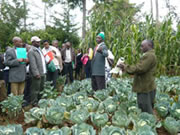"The Smallholder Horticultural Empowerment Project (SHEP Phase1)" (2006-2009) and "The Smallholder Horticultural Empowerment and Promotion Unit Project(SHEP UP)"(2010-2015), which have been implemented jointly by the State Department of Agriculture, the Ministry of Agriculture, Livestock and Fisheries(MOALF), the Horticulture Crops Development Authority (HCDA) in Kenya and the Japan International Cooperation Agency(JICA), developed an innovative approach to address the challenges of stagnant subsistence-based smallholder horticulture in Kenya. The innovation, subsequently entitled "the SHEP approach", shows the farmers the farmers the effectiveness of practicing market-oriented horticultural farming for improving their livelihoods. Inspired by the approach, the smallholder farmers have taken action to practice "farming as a business" by establishing linkages with business service providers through interactive forums, identifying the market demand through market surveys, producing what the market requires, and finally selling quality horticultural crops to their target market. The approach promotes a "grow to sell" concept with a focused purpose of producing what the market needs, as opposed to the conventional "grow and sell" concept, where farmers produce crops without thinking about market demand in advance. The farmers who took part in SHEP have significantly increased [1] their income from horticulture farming and their living standards have subsequently improved after their participation in SHEP.

From 2013, Kenya has been decentralized. Local governments called "County" are now main actor to implement the SHEP Approach. Under the circumstances, "Smallholder Horticulture Empowerment and Promotion Project for Local and Up-scaling: SHEP PLUS" has been started from 2015 to 2020 aiming the local governments to improve and customize the SHEP Approach. Through this project, it is expect that the local governments are able to manage their resources such as budget and human resources to utilize the SHEP Approach into their agriculture extension system.
Note
[1] The average 2,500 smallholder-farmers' income was US$273 in 2007. After two years of project activities, it had doubled to US$560 by 2009.




scroll